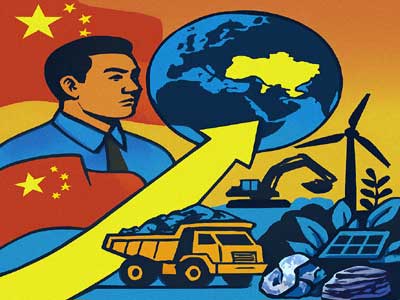Ukraine could position itself as the West’s answer to Chinese dominance in many critical raw material sectors, according to a new report by LSE IDEAS and Friedrich Ebert Stiftung.
In a comprehensive review of the country’s potential resources, the authors suggest Ukraine’s critical raw materials could be a strategic asset to its Western partners and a major revenue stream for Ukraine’s reconstruction efforts.
The country has significant reserves of materials that are integral to the green energy transition, including lithium and graphite, used in batteries, and gallium, used in semiconductors, as well as titanium and hafnium, key building materials, and more.
The report explains how processing facilities are critical to maximising the value of these sectors to the Ukrainian economy. For example, Ukraine’s lithium, the maximum value of raw spodumene and petalite concentrates would be around US$8.5 billion. However, if these resources were processed and used to make battery cathodes, the total value could rise to US$35 billion.
The report finds Ukraine already has well-developed infrastructure close to its critical raw material deposits and a workforce and service providers with applicable skills to begin extraction.
The authors write that Ukraine must invest in diplomatic efforts to convince its allies that helping it reach the later stages of the critical raw material value chain will be integral to its post-war viability.
"Our report offers credible estimates for Ukraine's potential to reduce Western reliance on dominant Chinese suppliers in a range of critical mineral sectors. To realise this potential, policymakers from Brussels to Washington and Kyiv need to converge around a framework that can ensure Ukraine captures the real economic benefits from their extraction and processing and not just minimal rents,” says Brian Milakovsky, Associate Researcher with the PeaceRep programme at LSE IDEAS.
“What is presently missing is a clear narrative around what the future of the sector in Ukraine will look like, how it will mix public and private sector funding and capabilities, balance geostrategic and economic interests, and a relationship of this narrative relates to policy and practice on the ground. This will be key to unlocking investment,” says Luke Cooper, Director of PeaceRep’s Ukraine programme at LSE IDEAS.
While Volodymyr Vlasiuk, CEO of Ukraine Industry Expertise, says, “Ukraine contains large reserves of critical minerals important for the green and digital transition. Some of these are significant in scale, are commercially viable and enjoy good access to modern transport infrastructure, enabling cost-effective logistics. When you add in other advantages that Ukraine has, from a history of commercial mining extraction with strong in-country technical expertise, cheap labour costs and its EU candidate membership status, then its investment potential as a strategic partner becomes clear.”
















Related Items
Photoactive natural protein could reshape electronic materials' future
India and China, two largest emerging economies are 'talk of the town'
China and other authoritarian regimes threaten international order